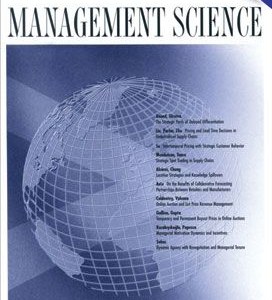
Baillon, A., Bleichrodt, H. and Spinu, V. (2020). Searching for the reference point Management Science, 66(1):93--112.
-
Affiliated authors
-
Publication year2020
-
JournalManagement Science
Although reference dependence plays a central role in explaining behavior, little is known about the way reference points are selected. This paper identifies empirically which reference point people use in decision under risk. We assume a comprehensive reference-dependent model that nests the main reference-dependent theories, including prospect theory, and that allows isolating the reference point rule from other behavioral parameters. Our experiment involved high stakes with payoffs up to a week{\textquoteright}s salary. We used an optimal design to select the choices in the experiment and Bayesian hierarchical modeling for estimation. The most common reference points were the status quo and a security level (the maximum of the minimal outcomes of the prospects in a choice). We found little support for the use of expectations-based reference points.